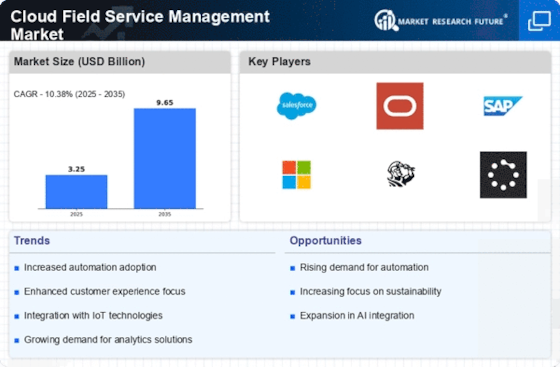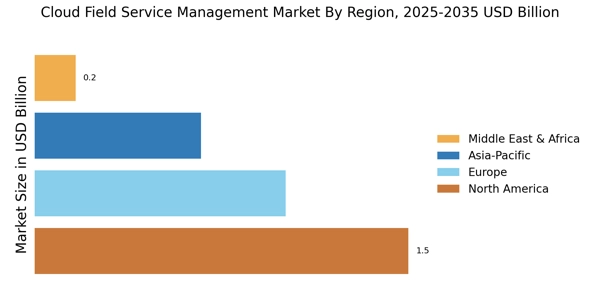Expansion of IoT Integration
The integration of Internet of Things (IoT) technology is significantly influencing the Cloud Field Service Management Market. IoT devices enable real-time monitoring of equipment and assets, allowing organizations to proactively address maintenance needs and reduce downtime. This capability is particularly beneficial in industries such as manufacturing and utilities, where equipment reliability is crucial. The market for IoT-enabled field service management solutions is expected to grow substantially, with estimates suggesting a potential increase of 25% in adoption rates over the next few years. This trend highlights the importance of cloud solutions in facilitating IoT integration.
Growing Importance of Data Analytics
Data analytics is becoming increasingly vital in the Cloud Field Service Management Market. Organizations are harnessing the power of data to gain insights into customer behavior, service performance, and operational bottlenecks. By utilizing advanced analytics tools, companies can make informed decisions that enhance service quality and drive strategic initiatives. The integration of analytics into field service management solutions is projected to increase by over 20% in the coming years, as businesses recognize the value of data-driven strategies. This trend underscores the necessity for organizations to adopt cloud solutions that facilitate comprehensive data analysis.
Emphasis on Customer-Centric Services
The Cloud Field Service Management Market is increasingly prioritizing customer-centric services. Companies are recognizing that enhancing customer experience is essential for retaining clients and driving growth. Cloud-based solutions provide the tools necessary to personalize service offerings, track customer interactions, and respond swiftly to inquiries. Recent findings indicate that organizations focusing on customer experience improvements can achieve up to a 15% increase in customer retention rates. This emphasis on customer-centricity is prompting businesses to invest in cloud technologies that enable them to deliver tailored services and foster long-term relationships with clients.
Rising Demand for Remote Work Solutions
The Cloud Field Service Management Market is experiencing a notable surge in demand for remote work solutions. Organizations are increasingly adopting cloud-based platforms to facilitate seamless communication and collaboration among field service teams. This shift is driven by the need for flexibility and efficiency in operations, allowing technicians to access critical information from any location. According to recent data, the market is projected to grow at a compound annual growth rate of approximately 14% over the next five years. This growth is indicative of the industry's response to evolving workforce dynamics, where remote capabilities are becoming essential for maintaining service quality and operational continuity.
Increased Focus on Operational Efficiency
Operational efficiency remains a pivotal driver within the Cloud Field Service Management Market. Companies are leveraging cloud solutions to streamline processes, reduce operational costs, and enhance productivity. By automating routine tasks and optimizing resource allocation, organizations can achieve significant improvements in service delivery. Recent statistics suggest that businesses utilizing cloud-based field service management tools report up to a 30% reduction in service delivery times. This efficiency not only boosts customer satisfaction but also contributes to higher profit margins, making it a compelling reason for companies to invest in cloud technologies.


















